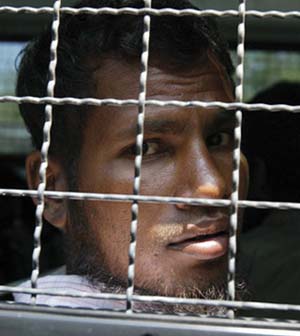The Rohingya remain one of the region’s most neglected ethnic minorities
FOR years, the plight of the Rohingya—a Muslim ethnic minority from the Burma-Bangladesh border—had been fading from world attention.
Then, earlier this year, it abruptly reemerged in the public eye following reports that the Royal Thai Navy had towed more than a thousand Rohingya boat people out to sea in engineless boats with little food or water.
 |
| A Rohingya migrant looks out the window of a police van while being transported from jail to he immigration police staion in Thailand’s southern province of Ranong in January. (Photo: AP) |
A few hundred were rescued near India’s Andaman Islands and Indonesia’s Aceh Province, but many others were not so lucky, and are presumed to have died at sea.
In February, actress Angelina Jolie, who is also a goodwill ambassador for the UN’s refugee agency, drew even more international attention to the issue during a visit to Karenni refugee camps in Thailand’s Mae Hong Son Province.
Although she did not directly criticize the Thai authorities for their treatment of the Rohingya, she said: “As with all people, they deserve to have their human rights respected.”
The Thai government, suddenly under a harsh spotlight for its handling of the issue, has attempted to address the concerns of relief agencies and human rights organizations.
In Burma, however, the ruling regime has adamantly refused to recognize the Rohingya as one of the country’s indigenous peoples, adding fuel to a fire that other countries in the region are trying to contain.
Thailand has long been on the frontlines of Burma’s humanitarian crises, and in this case, it is particularly concerned about the implications of the Burmese junta’s policies.
Not only is Thailand host to an estimated 120,000 refugees and perhaps 2 million migrant workers from Burma, it also has an Islamic separatist insurgency raging in its southern provinces and fears that the arrival of thousands of stateless Muslims could further destabilize the situation.
The Arakan Project, a Thailand-based NGO which advocates for the Rohingya, estimated in June 2008 that more than 8,000 Rohingya had reached Thai shores over the preceding two years, sailing from the coast of Bangladesh to southern Thailand; from there, most traveled overland to Malaysia.
The majority of Rohingya who make this perilous journey are looking for no more than an opportunity to earn a living in a less hostile environment than the one they left behind in Burma. Some, however, seek asylum—a process that is fraught with obstacles.
Thailand and Malaysia are not signatories to the 1951 United Nations Convention Relating to the Status of Refugees or its 1967 protocol, which define the rights of asylum seekers and the obligations of states to protect them.
Thus, although the UN High Commissioner for Refugees (UNHCR) has representatives in Bangkok and Kuala Lumpur, the agency’s mandate is subject to restrictions imposed on it by the Thai and Malaysian governments.
Meanwhile, in Thailand, the current Democrat-led government has attempted to deflect some of the criticism it has faced for its handling of this issue by insisting that the international community, and especially regional neighbors, must share responsibility for solving the Rohingya problem.
To this end, Thailand discussed the issue with representatives of the UNHCR and ambassadors from Bangladesh, India, Burma, Malaysia and Indonesia, and raised it again at the recent summit of the Association of Southeast Asia Nations (Asean), which last year formally enacted a charter that obliges member nations to respect human rights.
At the Asean summit, Burmese Foreign Minister Nyan Win said the boat people would be allowed to return, but only if they identified themselves as “Bengalis” born in Burma, rather than as Rohingyas.
Observers suggested that the Burmese response was just a token gesture to avoid embarrassing Asean governments and to end any discussion of the root causes of the problem, which include widespread human rights abuses in northern Arakan State.
It is clear, however, that Asean cannot afford to let the Burmese generals simply sweep this issue under the rug.

